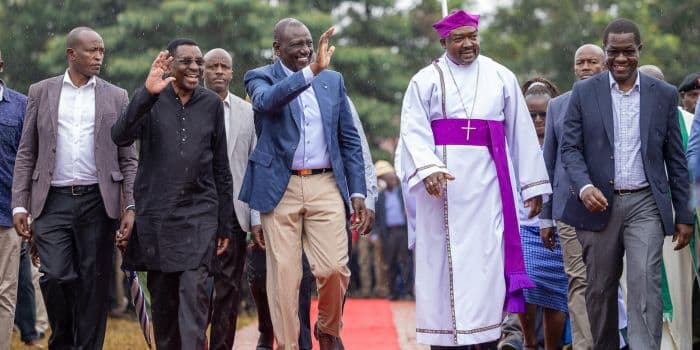We're loading the full news article for you. This includes the article content, images, author information, and related articles.
At a church service in Siaya, President Ruto challenged officials resisting his digital procurement reforms to resign and defended the Social Health Authority against fraud claims while unveiling infrastructure projects for the county.

Siaya, Kenya – President William Ruto on Sunday delivered a forceful warning to civil servants and politicians opposed to his administration’s digital reforms, telling them to resign if they cannot embrace change.
Speaking during a service at St Peter’s ACK Cathedral, Ruto defended the rollout of the electronic Government Procurement (e-GP) system, which digitises public procurement to curb graft. He said transparency required that “every Kenyan know the cost of goods and services,” and dismissed attempts to sabotage the system through negative media coverage.
The president accused unnamed officials of financing damaging headlines to undermine reforms. He insisted that the e-GP platform is essential to eliminating opaque tendering and entrenched corruption. “If you don’t like how we are running things, please allow others to do it,” he told the congregation, drawing applause.
Ruto also defended the new Social Health Authority (SHA), which centralises healthcare financing. He said digitisation had already exposed fraudulent claims and pledged that government funds would only be used to pay verifiable bills. “We will only pay what we can verify,” he stressed, positioning SHA as part of his wider effort to modernise service delivery.
Beyond governance reforms, the president unveiled a wide set of projects for Siaya County:
A new pier at Usenge and a planned pier at Asembo on Lake Victoria
Expansion of road funding from Ksh500 million to Ksh4 billion
Kenya Defence Forces tasked to upgrade the county stadium and referral hospital
Construction of 8,000 affordable housing units
Irrigation schemes to support food production
A Ksh20 million donation to the church
Ruto urged residents to evaluate his leadership by the infrastructure and services delivered rather than political rhetoric.
Analysts note that Ruto’s strategy combines direct confrontation with bureaucracy and highly visible local development. While the reforms may help curb corruption and expand services, their success depends on whether civil servants adopt the systems fully and whether oversight remains effective.
Keep the conversation in one place—threads here stay linked to the story and in the forums.
Sign in to start a discussion
Start a conversation about this story and keep it linked here.
Other hot threads
E-sports and Gaming Community in Kenya
Active 9 months ago
The Role of Technology in Modern Agriculture (AgriTech)
Active 9 months ago
Popular Recreational Activities Across Counties
Active 9 months ago
Investing in Youth Sports Development Programs
Active 9 months ago